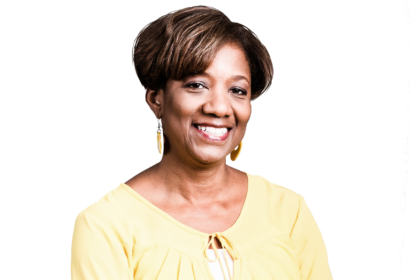
Valerie Hayes works with clients to help them successfully navigate in their current companies or help them define a new career path. She has a proven approach and develops a customized strategy to help each client navigate the ever-changing world of work and reach the next step in the career journey.
Here is what Valerie had to say when we asked her about listening and leading:
GenHERation®: What is active listening and what are your top three tips to practice this skill?
Valerie Hayes: Active listening in its simplest terms is really paying attention to the person you are speaking with and really dialing in. Back in the day, we had to turn a dial to get to a radio station. If we weren’t quite on the station, there was static. When we dialed in correctly, you heard the music. Active listening is really dialing in and finding that music. In terms of three tips to practice active listening, I would say one is to be focused. It is easy to be distracted by emails and texts. Block everything out and focus on who is speaking. Two is to let the other person know that you are listening. Give a little head nod. Three is do not interrupt another person when they are talking. A lot of times we are thinking of a response when someone is speaking, but give people the space to finish what they are saying.
GenHERation®: How does body language play a role in active listening?
Hayes: Body language plays a big part. Body language shows our emotions and what we are not verbally saying. Try to be conscious and aware of your body language. Are you closed off and crossing your arms? You also need to be aware of your facial expressions. When I am processing what someone is saying, I tend to look up and it may appear that I’m rolling my eyes. I am very conscious of this and make a concerted effort not to do it, as it may give the wrong signal. The other thing is to activate your smile. When you smile it engages the other person and encourages them to let their guard down and open up.
GenHERation®: When people are exploring potential career paths, where should they start?
Hayes: Step one is assessment. I don’t mean written assessments, I mean self-assessment. Ask yourself these questions: What am I interested in? What do I enjoy doing? What is important to me? What do I value? What are my strengths? What do I do naturally well? What are my personality traits? Putting all of these things into combination can lead to what might be a good career for you. Another thing you can do is reach out to people who are doing what interests you. When I was in college I wanted to be a sportscaster, so I tried my best to find a woman who was doing that. I researched national female sportscasters to find out more about them and I had a conversation with a local woman who was a sportswriter and guest on sports radio.
GenHERation®: How can people build relationships at any stage of their career?
Hayes: Building relationships is not a start and an end, it is a continuum. An easy way to start building a relationship is by saying “thank you.” Saying thank you opens up a dialogue. Secondly, there might be someone you are interested in talking to. Challenge yourself to find someone who knows that person who can introduce you. Third, get to know people and be sociable. Have a 15-minute coffee chat with someone. Make it an easy ask by including a $5 Starbucks gift card in the email invitation. Lastly, challenge yourself to get out of your comfort zone. Talk to people you don’t know, people who don’t look like you, and people who don’t think like you.
GenHERation®: What skills did you develop as a former Army Officer that you have been able to apply to your work as a Career Coach?
Hayes: Time management. I learned that in the Military and from my parents who are both veterans. I was taught that if you’re on time, you’re late. Also, early in my military career, I learned about decision making. I was a young Lieutenant and my Captain called me into his office because I was agonizing over a recommendation I needed to make in a report. He told me to use all of the information that I had, think about the possible outcomes of my recommendation, and then make a calculated decision. He told me that I better be able to explain my rationale for the decision, but analysis paralysis was not an option.
GenHERation®: What is the most important lesson you have learned throughout your career journey?
Hayes: Always try to help someone else.
Valerie Hayes works with clients to help them successfully navigate in their current companies or help them define a new career path. She has a proven approach and develops a customized strategy to help each client navigate the ever-changing world of work and reach the next step in the career journey. Valerie has provided leadership coaching to healthcare directors and executives to help them improve their leadership effectiveness. She has also coached all levels of talents in job search strategies, interview preparation, and salary negotiations. Prior to Korn Ferry Advance, Valerie served as the Director, Talent Acquisition for a management consulting firm. She also held recruiting positions with one of the nation’s largest healthcare companies and with a Big 4 consulting firm. Valerie holds a Bachelor of Arts Degree in Communication Studies from the University of North Carolina at Chapel Hill and a Master of Arts Degree in Counseling from Prairie View A&M University. She is a graduate of Duke University’s ROTC program, where she was commissioned as an Army Officer. She is also a Certified Professional Career Coach and a Certified Executive Coach.



Comments (0)